On Tuesday morning I woke up to find myself in an unfamiliar position in Malawi: I was alone. For the preceding two weeks I had been in the constant presence of other people: Liz and Jordan, Terra and Stephen, my fellow team members, the VIP staff and translators, our partner villagers, even my sleep was accompanied by the deep snoring of my roommate Tom. And in many ways being surrounded by other people felt very Malawian to me. The concept of alone time and being by oneself seemed very foreign to most Malawians. Houses in the villages are so small, and often so dark and depressing, that no one goes to their “own room” to be alone. People are always outside sitting together in front of their homes. And even when they go inside to sleep, they sleep together, often on the floor, sharing blankets. Outside of the homes, everywhere you go in the villages you see people together, walking together, working together, sitting and standing together, laughing and playing together, singing and dancing together, shopping and haggling together. Whatever they are doing, people always seem to be together. The instances of lone Malawians were so rare that they all stick out clearly in my mind. Indeed to be alone in Malawi seemed to cause a great deal of distress and anxiety. On one of our home visits to vulnerable families, Jordan and I met an old woman who was living in a large (by village standards) four room house with windows and doors. Jordan would later tell me that the woman we visited was the wealthiest person she had ever seen included on home visits to the most vulnerable. But after some thought, I realized that our staff had included her because even though she was not financially vulnerable, she was incredibly socially isolated. A rumor had begun in her village that she had lived so long because she was a witch, and as the years went by, the proof of her guilt mounted. So she was ostracized, treated as an outcast, and not included in the social life of the village. Thinking back on how important everyday social interactions are in Malawi, helps me to make more sense of her admission that “sometimes I ask God if he can take me to Heaven, because I don’t want to live here anymore.”
So finding myself alone on Tuesday, with Trudi off teaching and the Heinzel-Nelson’s in Blantyre to pick up John and Sandra Hurlbert, the first members of the second friendship team, who were arriving a day before everyone else, felt like an anomaly. But a very welcome one. It offered me a chance to collect my thoughts and to think back on some of the things that I had done and experienced in the last whirlwind two weeks. So I grabbed a late breakfast (practically a lunch by Malawian standards) and walked up to the Heinzel-Nelson’s porch in the shadow of the plateau to think and write.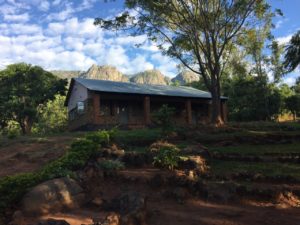
On my very first night in Malawi I broke my phone, watching in horror as it slipped off the sink, where it had lain impossibly balanced, to come to a screen smashing thud against the hard concrete floor. At first I was very distressed by my broken phone, wondering what I was going to do, how would I wake up, how would I keep in touch with family and friends, what would keep me occupied during times of boredom? But the broken phone turned out to be a blessing in disguise. Untethered from my electronic crutch (overlord?), I was able to fully immerse myself in the rhythms of Malawi and to be fully present during the entire trip. I didn’t rely on an alarm to wake me up, I would generally get up as the rays of the sun stubbornly found their way through the cracks that would inevitably remain in my curtains despite my best efforts to block the window completely, although on one or two occasions I was awoken by the sound of the farm staff chopping wood for three hours, directly outside my window, beginning at 3:30 in the morning. But whichever of these systems I relied on to get up, it felt organic and true to the country that I was living in.
When we drove through the villages I didn’t have my nose buried in my phone, playing a mindless game, sending texts, or closing and then immediately reopening Instagram for the 12th time in a row. I looked out the window and watched the people as they went about their days. I waved to little kids from the back of the pickup as they ran towards me screaming out “Azungu, azungu!” and I talked with my teammates, Malawian and American, and learned more about their lives and experiences. And most importantly I began to remove the shackles of time that seem to drive the lives of most westerners. I didn’t ask myself why we had been sitting in a parking lot for twenty minutes and begin to fret that we were going to be late for whatever we had planned for the day. I realized that things work differently in Malawi, that time, while in some ways much more crucial to the lives of people living by the cycles of the sun and moon, does not have the same power in Malawi that we accord it in the western world. I learned that sometimes it is better to laugh, longue around and get to know someone than it is to finish whatever project we were hoping to get through that day.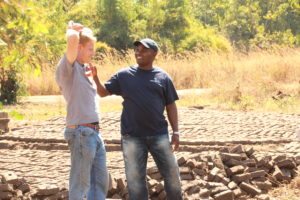 Finally, I was able to fully enjoy and experience everything that was going on around me through my own eyes, not through the lens of a camera, or viewed through the screen of my phone. When an elephant was looking me in the eye from a few feet away I was able to look right back into her eyes and see her quiet intelligence because I wasn’t scrambling to get a picture.
Finally, I was able to fully enjoy and experience everything that was going on around me through my own eyes, not through the lens of a camera, or viewed through the screen of my phone. When an elephant was looking me in the eye from a few feet away I was able to look right back into her eyes and see her quiet intelligence because I wasn’t scrambling to get a picture.
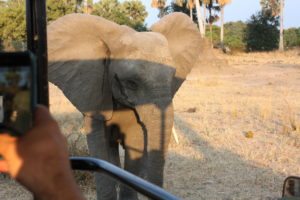
Whenever we are greeted by village women singing and dancing I am able to clap and sing along without wondering if I should be recording any of it. And when we are driving in the back of the pickup truck I am able to take in the ruggedly beautiful hills of Sakata and its endless skies without worrying if I got the perfect shot. Besides I had everyone else to take the pictures for me!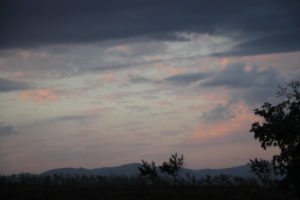
So I’m happy that I broke my phone and I would recommend to all future friendship trip participants that they break their phones as well, or at least leave them in their rooms when they go out for the day. You just get to experience a much more authentic side of Malawi when you free yourself from your phone. That is not to say that the villagers of Malawi do not have phones, indeed smart phones are becoming much more affordable and common throughout Malawi and all of sub-Saharan Africa. I can remember meeting with poor families and watching as someone surreptitiously checked their phone, before quickly hiding it back away, perhaps rightfully scared that most Americans would judge them for having a phone, a modern convenience which doesn’t meet with our arbitrary definition of how poor people should live. But I see our primary role in Malawi as learners, not always helpers, and very rarely as teachers. And it is much easier to learn from people without the intruding presence of our phones.
Before coming to Malawi I knew that a belief in magic, in spells and witches and wizards was still strong in rural areas. But it was still a shock to me, as in the case of the old woman that Jordan and I met who had been accused of being a witch, when I encountered these beliefs myself. I remember speaking to a group of villagers who had been trained by VIP to become beekeepers and who were generating a profit harvesting and selling honey from their carefully protected hives.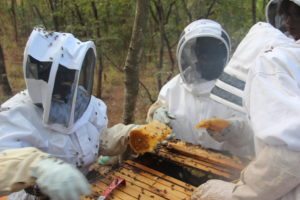 A few weeks ago some of the hives were broken in to and the honey inside was stolen. I asked Frank Mwenjemeka, our Agricultural Officer and an avid apiarist, to ask the beekeepers what they were doing now to guard against more thievery. As they delivered their answer to him, Frank began to laugh. I asked Frank what they had said and he replied that in addition to keeping watch during the day they were going to use “juju” or magic to keep their beloved hives safe at night. Indeed, even some members of our staff retain certain beliefs in magic from their childhoods in the village. I remember Mwalabu, VIP Project Coordinator, telling us over dinner one night about the belief in magic within his own family, which prompted Liz to blurt out the immortal question “Was your uncle a wizard?!” But as strange, and at times humorous, as it may seem to us, Malawians belief in magic can take very ugly turns. There have been reports of albinos being murdered by criminal gangs and human traffickers because their bones are claimed by Witch Doctors to bring wealth, happiness and good luck.
A few weeks ago some of the hives were broken in to and the honey inside was stolen. I asked Frank Mwenjemeka, our Agricultural Officer and an avid apiarist, to ask the beekeepers what they were doing now to guard against more thievery. As they delivered their answer to him, Frank began to laugh. I asked Frank what they had said and he replied that in addition to keeping watch during the day they were going to use “juju” or magic to keep their beloved hives safe at night. Indeed, even some members of our staff retain certain beliefs in magic from their childhoods in the village. I remember Mwalabu, VIP Project Coordinator, telling us over dinner one night about the belief in magic within his own family, which prompted Liz to blurt out the immortal question “Was your uncle a wizard?!” But as strange, and at times humorous, as it may seem to us, Malawians belief in magic can take very ugly turns. There have been reports of albinos being murdered by criminal gangs and human traffickers because their bones are claimed by Witch Doctors to bring wealth, happiness and good luck.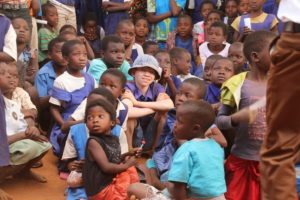 And as tragic and unacceptable as these stories are the appropriate response is not to ridicule the beliefs of the “backwards Africans,” and lecture them on what is true and what is not, which will not change anything. Beliefs in witchcraft and magic flourish in an atmosphere of fear, poverty, and disease when people look for otherworldly causes to explain the suffering that they see around them. Only when we address the poverty that plagues the region and casts a pall over everything will these anachronistic beliefs finally begin to fade away.
And as tragic and unacceptable as these stories are the appropriate response is not to ridicule the beliefs of the “backwards Africans,” and lecture them on what is true and what is not, which will not change anything. Beliefs in witchcraft and magic flourish in an atmosphere of fear, poverty, and disease when people look for otherworldly causes to explain the suffering that they see around them. Only when we address the poverty that plagues the region and casts a pall over everything will these anachronistic beliefs finally begin to fade away.
Perhaps belief in magic is still strong because of the darkness that still lies over much of the continent. There is a long history of Europeans and westerners referring to Africa as the “Dark Continent.” Up until the 19th century, Europeans were unable to penetrate into the interior of Africa and it remained one of the last blank spaces of the map, waiting to be discovered by the “civilized” Europeans. And so they often referred to Africa as the Dark Continent, both in reference to the impenetrable nature of a land that remained shrouded in mystery and to the supposed savage rituals and beliefs that they naturally assumed were endemic to the region. Joseph Conrad took a different, and decidedly less racist, tact with his classic novel The Heart of Darkness. The title did not refer to Africa itself, as many still believe, but rather to the evils of European Imperialism which reached its most violent, rapacious and unrestrained form in the heart of the Congo Free State, where King Leopold of Belgium enslaved, slaughtered and butchered tens of millions of Congolese in his pursuit of rubber, ivory and empire.
With such a fraught history behind it, it would seem safer to avoid referring to Africa as the “Dark Continent.” But as I walked down the streets of Malawi on Monday night, I couldn’t help but think of it as such. It was 7:30 and the moon had not yet risen, and I was walking down from the VIP offices to meet Liz and the Landcruiser at the bottom of the hill, a walk of a mile or so, but to me it felt like a marathon. Growing up right outside of New York City, I had never encountered streets like this. Removed from the reassuring street lights and charming gas lights of my hometown, the constant car headlights that provided their own unnaturally bright illumination and the omnipresent light pollution from neighboring Manhattan that caused the night-time horizon to glow a faint orange, I suddenly found myself walking in complete and utter darkness, the likes of which I have never known before in a populated area. I had left my headlamp back at the farm and without a phone to light my way (it didn’t feel like such a blessing at that moment) I felt like a blind man feeling my way down the street. People would suddenly loom out of the darkness directly in front of me causing me to audibly gasp and jump back from them. Every few minutes a car would come tearing down the hill and I would jump to the side falling into a gutter or prickly bush that I didn’t know was there. As I walked down through the darkness, worried that a stray dog or hyena that had made its way in from the bush was silently stalking me, I found myself rather ridiculously thinking that I finally understood how much fire had changed life for prehistoric man, lifting them above a state of nature, and the constant fear that accompanied that state of nature, for the first time. But as Jim Garst said while the first team was over: In Malawi people live so much closer to nature and to the way most people in the world still live. We, who take cell phones, science and electricity for granted are the exceptions, and it is good to take a walk in other people’s shoes from time to time.

Justin, I have really been enjoying your posts. Your experiences are so insightful and touching. Really brings me back to my own trip 3 yrs. ago. Can’t wait to hear your next posts!
Great article. Well done. Removing the burden of electronics really opened the world.